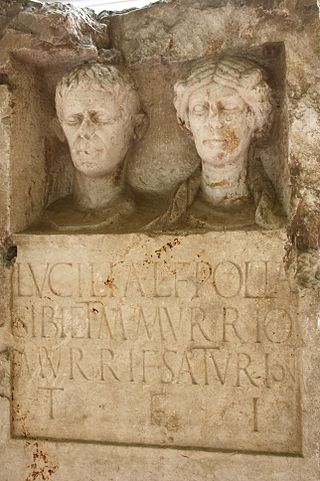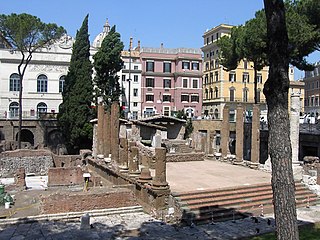
Lucius Annaeus Seneca the Younger, usually known mononymously as Seneca, was a Stoic philosopher of Ancient Rome, a statesman, dramatist, and in one work, satirist, from the post-Augustan age of Latin literature.

The gens Lucilia was a plebeian family at ancient Rome. The most famous member of this gens was the poet Gaius Lucilius, who flourished during the latter part of the second century BC. Although many Lucilii appear in Roman history, the only one known to have obtained any of the higher offices of the Roman state was Lucilius Longus, consul suffectus in AD 7.

Panaetius of Rhodes was an ancient Greek Stoic philosopher. He was a pupil of Diogenes of Babylon and Antipater of Tarsus in Athens, before moving to Rome where he did much to introduce Stoic doctrines to the city, thanks to the patronage of Scipio Aemilianus. After the death of Scipio in 129 BC, he returned to the Stoic school in Athens, and was its last undisputed scholarch. With Panaetius, Stoicism became much more eclectic. His most famous work was his On Duties, the principal source used by Cicero in his own work of the same name.
Publius Nigidius Figulus was a scholar of the Late Roman Republic and one of the praetors for 58 BC. He was a friend of Cicero, to whom he gave his support at the time of the Catilinarian conspiracy. Nigidius sided with the Optimates in the civil war between Julius Caesar and Pompeius Magnus.

The Correspondence ofPaul and Seneca, also known as the Letters of Paul and Seneca or Epistle to Seneca the Younger, is a collection of letters claiming to be between Paul the Apostle and Seneca the Younger. There are 8 epistles from Seneca, and 6 replies from Paul. They were purportedly authored from 58–64 CE during the reign of Roman Emperor Nero, but appear to have actually been written in the middle of the fourth century. Until the Renaissance, the epistles were seen as genuine, but scholars began to critically examine them in the 15th century, and today they are held to be inauthentic forgeries.
Aristo of Chios, also spelled Ariston, was a Greek Stoic philosopher and colleague of Zeno of Citium. He outlined a system of Stoic philosophy that was, in many ways, closer to earlier Cynic philosophy. He rejected the logical and physical sides of philosophy endorsed by Zeno and emphasized ethics. Although agreeing with Zeno that Virtue was the supreme good, he rejected the idea that morally indifferent things such as health and wealth could be ranked according to whether they are naturally preferred. An important philosopher in his day, his views were eventually marginalized by Zeno's successors.

The gens Pompeia was a plebeian family at ancient Rome, first appearing in history during the second century BC, and frequently occupying the highest offices of the Roman state from then until imperial times. The first of the Pompeii to obtain the consulship was Quintus Pompeius in 141 BC, but by far the most illustrious of the gens was Gnaeus Pompeius, surnamed Magnus, a distinguished general under the dictator Sulla, who became a member of the First Triumvirate, together with Caesar and Crassus. After the death of Crassus, the rivalry between Caesar and Pompeius led to the Civil War, one of the defining events of the final years of the Roman Republic.
Ancient Roman philosophy is philosophy as it was practiced in the Roman Republic and its successor state, the Roman Empire. Roman philosophy includes not only philosophy written in Latin, but also philosophy written in Greek in the late Republic and Roman Empire. Important early Latin-language writers include Lucretius, Cicero, and Seneca the Younger. Greek was a popular language for writing about philosophy, so much so that the Roman Emperor Marcus Aurelius chose to write his Meditations in Greek.

The gens Lutatia, occasionally written Luctatia, was a plebeian family of ancient Rome. The first of the gens to obtain the consulship was Gaius Lutatius Catulus in 242 BC, the final year of the First Punic War. Orosius mentions their burial place, the sepulchrum Lutatiorum, which lay beyond the Tiber.
The gens Terentia was a plebeian family at ancient Rome. Dionysius mentions a Gaius Terentius Arsa, tribune of the plebs in 462 BC, but Livy calls him Terentilius, and from inscriptions this would seem to be a separate gens. No other Terentii appear in history until the time of the Second Punic War. Gaius Terentius Varro, one of the Roman commanders at the Battle of Cannae in 216 BC, was the first to hold the consulship. Members of this family are found as late as the third century AD.
This page is a list of topics in ancient philosophy.
Quintus Junius Arulenus Rusticus was a Roman Senator and a friend and follower of Thrasea Paetus, and like him an ardent admirer of Stoic philosophy. Arulenus Rusticus attained a suffect consulship in the nundinium of September to December 92 with Gaius Julius Silanus as his colleague. He was one of a group of Stoics who opposed the perceived tyranny and autocratic tendencies of certain emperors, known today as the Stoic Opposition.
Sotion, a native of Alexandria, was a Greek Neopythagorean philosopher who lived in the age of Tiberius. He belonged to the school of the Sextii, which was founded by Quintus Sextius and combined Pythagoreanism with Stoicism. Sotion was the teacher of Seneca the Younger, who "sat as a lad, in the school of the philosopher Sotion." Seneca derived from him his admiration of Pythagoreanism, and quotes Sotion's views concerning vegetarianism and the migration of the soul:
You do not believe that souls are assigned, first to one body and then to another, and that our so-called death is merely a change of abode? You do not believe that in cattle, or in wild beasts, or in creatures of the deep, the soul of him who was once a man may linger? You do not believe that nothing on this earth is annihilated, but only changes its haunts? And that animals also have cycles of progress and, so to speak, an orbit for their souls, no less than the heavenly bodies, which revolve in fixed circuits? Great men have put faith in this idea; therefore, while holding to your own view, keep the whole question in abeyance in your mind. If the theory is true, it is a mark of purity to refrain from eating flesh; if it be false, it is economy. And what harm does it do to you to give such credence? I am merely depriving you of food which sustains lions and vultures.
Sextius Niger was a Roman writer on pharmacology during the reign of Augustus or a little later. He may be identical with the son of the philosopher Quintus Sextius, who continued his philosophical teachings.
Seneca's Consolations refers to Seneca’s three consolatory works, De Consolatione ad Marciam, De Consolatione ad Polybium, De Consolatione ad Helviam, written around 40–45 AD.

The gens Antonia was a Roman family of great antiquity, with both patrician and plebeian branches. The first of the gens to achieve prominence was Titus Antonius Merenda, one of the second group of Decemviri called, in 450 BC, to help draft what became the Law of the Twelve Tables. The most prominent member of the gens was Marcus Antonius.
The gens Sextia was a plebeian family at ancient Rome, from the time of the early Republic and continuing into imperial times. The most famous member of the gens was Lucius Sextius Lateranus, who as tribune of the plebs from 376 to 367 BC, prevented the election of the annual magistrates, until the passage of the lex Licinia Sextia, otherwise known as the "Licinian Rogations," in the latter year. This law, brought forward by Sextius and his colleague, Gaius Licinius Calvus, opened the consulship to the plebeians, and in the following year Sextius was elected the first plebeian consul. Despite the antiquity of the family, only one other member obtained the consulship during the time of the Republic. Their name occurs more often in the consular fasti under the Empire.
Papirius Fabianus was an Ancient Roman rhetorician and philosopher from the gens Papirius in the time of Tiberius and Caligula, in the first half of the 1st century AD.
The School of the Sextii was an eclectic Ancient Roman school of philosophy founded around 50 BC by Quintus Sextius the Elder and continued by his son, Sextius Niger, however it went extinct shortly after in 19 AD due to the ban on foreign cults. The school blended elements of Pythagorean, Platonic, Cynic, and Stoic philosophy together with a belief in an elusive incorporeal power pervades the body in order to emphasize asceticism, honesty, and moral training through nightly examinations of conscience as a means of achieving eudaimonia. The primary sources of information on the school are Seneca the Younger, who was taught by one of its members named Sotion, and the 5th century writer Claudianus Mamertus. Other members of the school included Papirius Fabianus, Crassicius Pasicles, Celsus. While Seneca the Younger often conflates the school with Stoicism, the Sextians were not as inclined to rigorous logical exercises or any abstruse abstract thinking, and unlike the Stoics, advocated avoidance of politics, engaging in the correspondence between words and life, and vegetarianism.
The gens Gratidia was a plebeian family at ancient Rome. Originally coming from Arpinum, members of this gens are known from the final century of the Republic.
 lix. 7–8 .,
lix. 7–8 .,  lxiv, 2–5 .,
lxiv, 2–5 .,  lxxiii. 12–15 .,
lxxiii. 12–15 .,  xcviii. 13 .,
xcviii. 13 .,  cviii. 17–18 .; De Ira, ii. 36, iii. 36.
cviii. 17–18 .; De Ira, ii. 36, iii. 36.





